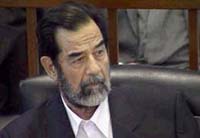
The trial of Saddam Hussein on charges of crimes against humanity Wednesday heard some of the strongest evidence yet linking the former Iraqi president and his co-defendants to alleged torture.
A witness told the court that Saddam's guards applied electric shocks to detainees at the headquarters of his feared intelligence service in Baghdad, and heated up plastic tubing and allowed the hot plastic to drip onto the bodies of victims.
"They would be in such pain as the plastic solidified on their bodies," the witness recalled. "A man would leave on his feet and come back thrown in a blanket."
Saddam and seven co-defendants, including his former intelligence chief Barzan Ibrahim al-Tikriti, are standing trial in connection with the killing of 148 people from the mainly Shi'ite village of Dujail, north of Baghdad, in the 1980s.
Prosecuters say Saddam ordered the killings in reprisal for a failed bid to assassinate him in the village in 1982.
Previous witnesses have given sometimes rambling and imprecise accounts of hardships they suffered under Saddam but the latest, Ali Hassan al-Haidari, spoke calmly and coherently and made a specific allegation against Barzan.
He said Saddam's half-brother Barzan had been present in the building where the torture took place and had kicked him once as Haidari lay in a hallway suffering from a fever. "He said to the guards 'Do not treat him, this family does not deserve to live," Haidari said. "I was in pain for weeks because of that kick."
Barzan lost his temper several times. During six trial hearings he has emerged as the most outspoken defendant, eclipsing even Saddam, who seemed subdued yesterday.
At one point Barzan leapt to the defence of another defendant, former Iraqi vice-president Taha Yassin Ramadan, when the witness accused Ramadan of bulldozing farms in Dujail.
"His (Ramadan's) shoe is more honorable than you and all your tribe, you dog!" Barzan shouted at Haidari.
Court guards twice opened the gate to the caged defendants' dock as if to remove Barzan but the judge ordered them to stop.
Saddam had boycotted the previous session of the trial on December 7 after telling judges to "go to hell," but was back yesterday, dressed immaculately, taking notes and listening intently inside the heavily fortified Baghdad courtroom.
At one point he asked the judge for a break in proceedings to pray. "A note from God," Saddam said. "The prayer time has passed. Let us pray and continue."
When the judge refused his request, Saddam swivelled in his black leather chair, faced the witness and rocked slightly in his seat in apparent prayer.
Brave man appears in court openly
Haidari's testimony was among the most graphic so far in the stop-start and often chaotic trial, which started on October 19 and has been adjourned three times.
Unlike most of the previous 10 prosecution witnesses, he appeared in open court and gave his name rather than testifying from behind a curtain out of fear for his life.
Dressed in a brown suit and white shirt, he recalled details of the Dujail killings, which occurred when he was just 14.
He said he was taken to the Baath Party office in Dujuail, where he saw the bodies of nine people he knew, and then to the Baghdad headquarters of Saddam's intelligence service.
That is where he saw the worst of the torture, he said.
Haidari said that even if Saddam was not directly involved with it, he had to be guilty of ordering it.
"At that time no one acted on his own unless orders were given by Saddam," he said. "I hold Saddam responsible for detaining me and my family and ruining my future."
Haidari was the first of five witnesses to testify yesterday. Kurdish judge Rizgar Mohammed Amin was then expected to adjourn the trial until the second half of January.
(China Daily December 22, 2005)
|

